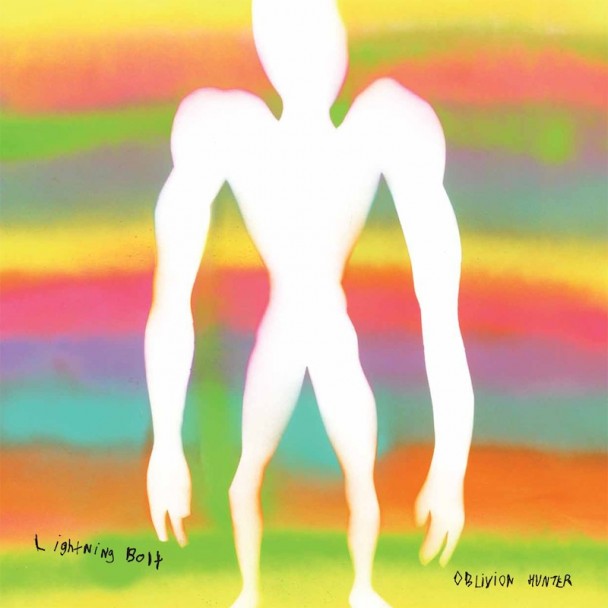It’s always difficult to translate a ferocious live show into a comparable sounding studio recording. Just look at some of the best live bands over the past four decades and notice how they always sound better live, even if it’s in some rundown, back alley dive bar. There’s something inherently primal, spiritual even, about seeing a band tearing up some stage as fans scream and yell in a disorganized cacophony of voices, sweat, and adrenaline. The venue becomes a church and the stage an alter. And all those in attendance feel the electricity, feeding from it as it seems to rise up around them. This is the way it has been since music became communal. And the best bands play to that sense of collective hysteria that drives fans crazy. There have only been a handful of bands that manage to successfully render that live experience in the studio, and Lightning Bolt, known for their insanely manic shows, are among the best.
Oblivion Hunter, a collection of unreleased material recorded over four years ago, seems at first glance to be a way for Lightning Bolt to give fans some new(-ish) material without the expectations of a full studio album. This EP–and an EP in name only, as this album is as long as most traditional full-lengths–trades out their decidedly confrontational assault for a more varied, though still devastating, approach. This is still Lightning Bolt however, no matter the context, and as such, there are going to be constants that any fan should recognize. Brian Chippendale still destroys his drums as though they’re his last means of salvation, and Brian Gibson thumps through his bass lines like he’s jackhammering away at the earth. It’s really standard stuff for Lightning Bolt actually, but even on these tracks, the fierceness and exacting attention to the interplay between the drums and bass stand in stark contrast to other bands who simply rely on studio mechanics to emulate some semblance of instinctual proficiency.
Opening track “King Candy” bursts from the speakers in waves of amplified distortion and chest-kneading drums — exactly what you think of when you imagine this band live. Chippendale growls and shrieks above the din, wallowing in the confusion and clamoring noise, and seems perfectly at ease among the blistering crash of guitars and drums. Gibson is the consummate bass player, allowing his warped notes to bend and weave among the drum flourishes and generally incoherent lyrics. “Baron Wasteland” picks right up and covers the listener in a layer of amplifier hiss and monosyllabic screams. It’s a full-bore assault, and the band seems to be daring the listener to take a step back. There really is no easy way to acclimate yourself to this band.
Where past albums found strength and creative determination in their ability to fashion relative harmony in the midst of disorganization, Oblivion Hunter falters when it tries to bring together the bands penchant for total sonic immersion and something akin to restraint. “Oblivion Balloon” tries its hand at a repeating melody, which doesn’t necessarily play to the duo’s strengths, and they quickly run it into the ground. By the time we get to the end of the song, the melody has been overtaken by a cascading wall of drum and bass sound, and any sense of restraint is all but lost. It seems like the band was hesitant about their ability to pull off such a structured idea, and it appears as though they gave up and just threw everything into the song to make it sound more “Lightning Bolt”-esque. Other tracks like “Salamander” and album closer “World Wobbly Wide” make grand gestures in the spirit of past albums but fail to find a functional rhythm and wind up being less about the marathon momentum that the band is known for and more concerned with a cluttered, static murkiness, which fails to do the songs justice.
Though as fundamentally similar to past Lightning Bolt records as Oblivion Hunter sounds, it does fall short of the success of records like Hypermagic Mountain or Wonderful Rainbow. You can excuse this if you want considering the aged nature of the tracks (though you shouldn’t) but I think the truth is some of these songs are just not as cohesive as those on previous records. Tracks like “Fly Fucker Fly,” which sounds distrustfully melodic, and “The Soft Spoken Spectre,” which amounts to very little in its short runtime, show the band stretching their dissonant tendencies into new sonic territory. And given more time to explore these new textures, the band could have successfully developed another facet to their already engrossing sound. As it stands, these songs represent a promising new direction for Lightning Bolt, but one that they have yet to fully prove themselves adept at. Sometimes I want variety in my music and sometimes I want to be thrown against the back wall in some bar, as waves of thunderous notes drown out everything around me. Maybe at some point in the future we can have it both ways with Lightning Bolt. Right now though, we still have the noise. And lord, what a fearsome noise it is.

